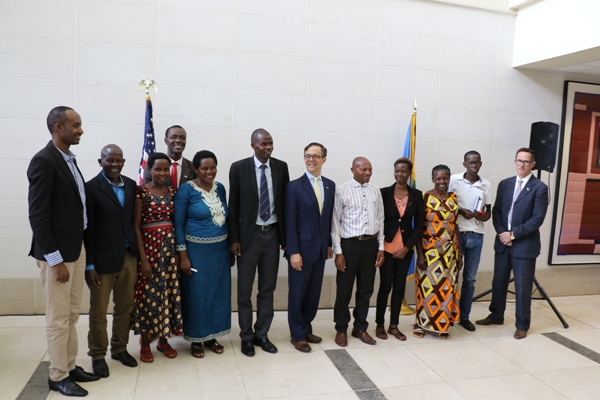
Kigali: This Thursday the U.S. Embassy awarded grants worthy $55,000 (approximately 50 million RWF) to four cooperatives in Rwanda. These grants, made possible by the U.S. Department of State Ambassador’s Small Grants (ASG) Fund, aim to support projects that are initiated at the community level, encourage community participation, and improve living conditions in the community.
Ranging from sugarcane production, fishpond farming, beekeeping, and small irrigation systems making and are distributed in four different provinces districts, two in Eastern Province and two in Southern Province. The projects, which are expected to assist more than 400 direct beneficiaries and 1,000 indirect beneficiaries, are scheduled to start in October 2019 and be completed by September 2020.
U.S. Ambassador to Rwanda Peter Vrooman and the Director General for the Rwanda Cooperative Agency, Professor Jean Bosco Harelimana signed the grants during the grant signing ceremony that took place at the U.S. Embassy. Last year awardees, including Cooperative des Riziculteurs dans le Marais de Rurambi (Corimaru); Coproma from Kayonza; Kora Mworozi from Gicumbi and SUFACO-Ntarama, attended the event.
The Ambassador’s Small Grants was initially established by the United States Agency for International Development (USAID) in Togo in 1964. The Fund now assists people in 45 African nations and is administered by the U.S. Department of State, Bureau of African Affairs. Through this Fund alone, the U.S. Embassy in Kigali has partnered 188 Rwandan cooperatives and organizations since 1999. The U.S. Embassy accepts applications for the SSH Fund on a rolling-basis. Grants are usually awarded between August and September.
The four cooperatives that benefited this year’s “Ambassador’s Small Grants” include:
SUFACO, a sugar cane cooperative in Kamonyi, Southern Province. Their $15,000 grant will help them protect their harvest from flooding by building small drainage systems, maintaining the main canal, and raising the banks of the Akagera River. It will also help them to drain areas of the marshland currently dominated by papyrus and increase the amount of land available for cultivation.
Twitezimbere-Kiyonza, a cooperative in Nyaruguru District, Southern Province. They have been involved in maize, soybean, and tomato farming since 2007. The cooperative’s members, a majority of whom are women, are sub-divided into 10 “Self-Help” groups. Their grant of $14,990 will be used to procure several additional small irrigation diesel pumps and other accessories for distribution to the 10 self-help groups. These pumps will increase production will increase benefitting the cooperative.
FLAMINE Humuka Munyarwandakazi located in Kayonza District, Eastern Province. FLAMINE is a youth cooperative that operates five fishponds in an area that used to be part of the larger Akagera National Park before the park was reduced and fenced. Their $14,989 grant will be used to install a borehole to operate the fingerling incubator/hatchery, create three new fishponds, and construct new canals to deviate flooding.
KOPANYAKA, also located in Kayonza District, Eastern Province. area cooperative of honey harvesters Their $11,129 grant will be used to purchase four large (10,000 liter) water tanks to harvest water, plant fruit trees that can produce flowers, and refurbish their bee shelter, all of which will allow them to utilize an arid area for honey production. (End)
